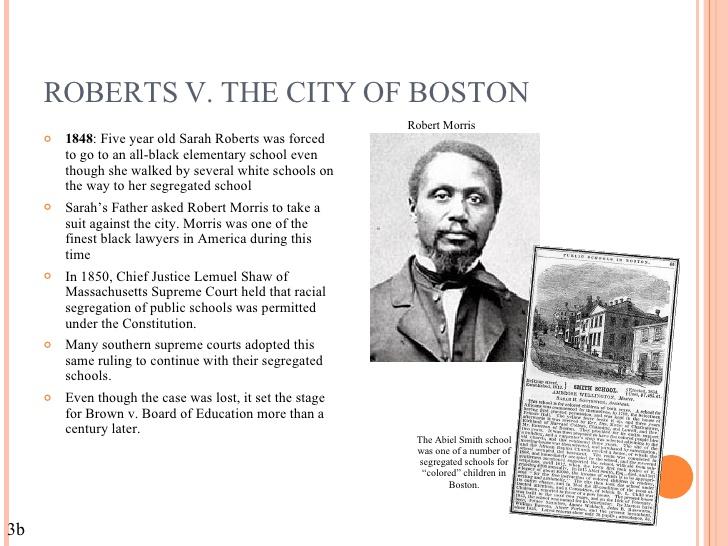
Morris-Inspired Monday
The first school desegregation case, Roberts v Boston, was filed on February 15, 1848 in Boston, Massachusetts by Robert Morris, Sr. Attorney Morris was the second Black lawyer in the United States. He initiated the action on behalf of five year old Sarah Roberts, who had been prohibited from attending the school that was the closest to her house because she was Black. The General School Committee required that Roberts register at the school for Black children, and not the closer school which had been designated for White children. Ironically, the segregated school system in Boston had been constructed to redress racial discrimination within the school system at the turn of the century.
The petitioner lost at each stage of the adjudication process. Ultimately, the Massachusetts Supreme Court rejected the petitioner’s argument, that because Massachusetts had abolished slavery 13 years earlier, it was illegal to bar Black students from attending schools with White students. The Massachusetts Supreme Court, in a unanimous decision authored by the well-respected and anti-slavery Chief Justice Lemuel Shaw, opined, essentially, that the General School Committee had decided:
“That the good of both classes of schools will be best promoted [by segregation]…
“[and that if the source of the committee’s decision was actually prejudice] this prejudice is not created by law, and probably cannot be changed by law.”
In effect, the court held in Roberts that separate did not mean unequal under the law.
Eventually, Roberts and allies prevailed in their efforts, by successfully lobbying the state legislature to pass the first law in the country banning segregation in education in 1855. Nonetheless, the decision issued by the state Supreme Court was cited approvingly by courts throughout the North and the South, including the United States Supreme Court in its infamous decision Plessy v Ferguson.
Robert Morris, Sr., the legal mind behind the case, was admitted to the Massachusetts bar in 1847, three years after the first Black lawyer was admitted to practice law in Maine, and then in Massachusetts. Morris gained prominence and respect for his role in efforts of the Roberts, on behalf of the Black families in Boston. Many citations refer to Morris as only being an assistant to Charles Sumner, who is often credited with being the lead attorney. Attorney Sumner, an abolitionist, was actually recruited to the case by Morris. Sumner played a prominent role in the trial and the primary one before the United States Supreme Court, but the legal action was initiated by Attorney Morris.
Roberts v Boston, http://www.longroadtojustice.org/topics/education/sarah-roberts.php
Prelude to Brown on Brown v Board website
The Sarah Roberts Case as presented by the National Park System